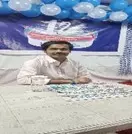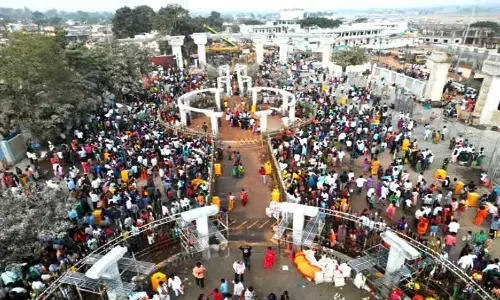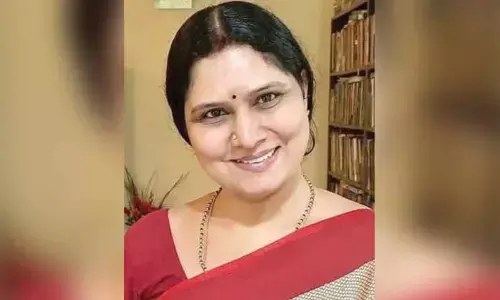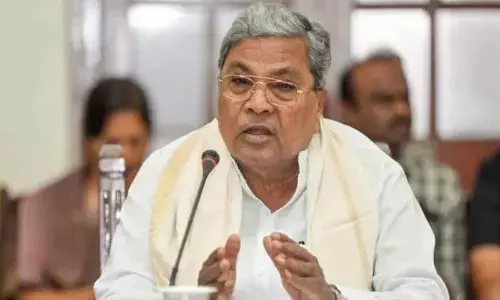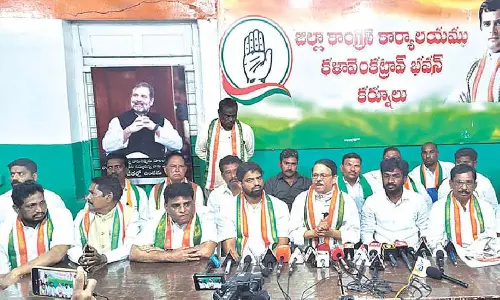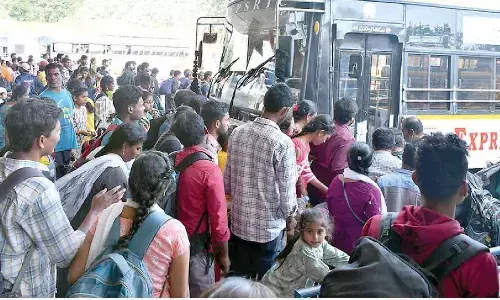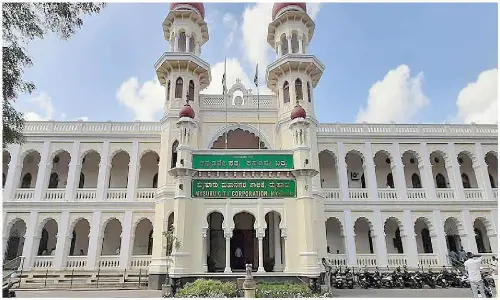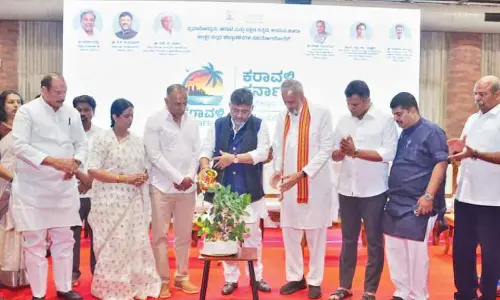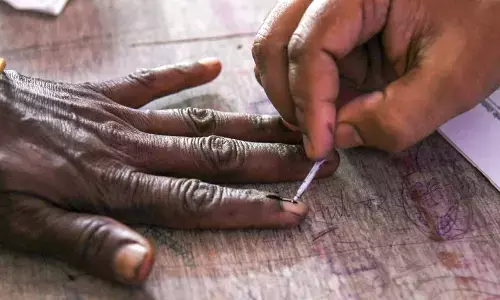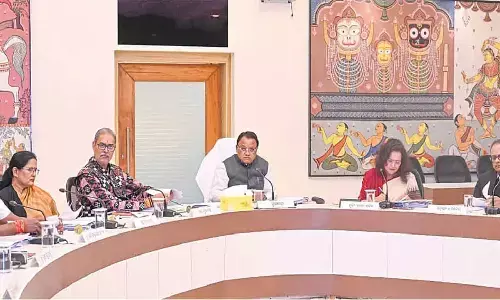KTR inaugurates RRR knowledge Hub introduced by Telangana government
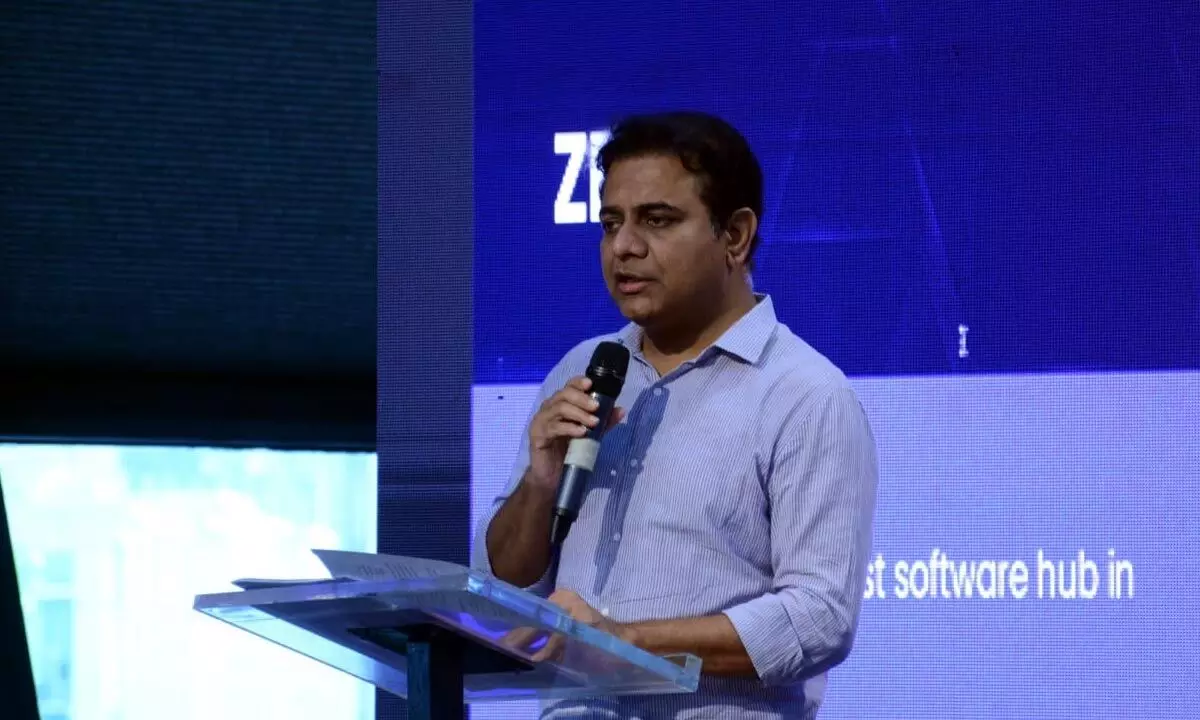
Telangana Govt out to implement norms to promote water neutrality: KTR
- Stresses on the importance of World Environment Day
- Informs that government has set up a total of 1962 RRR centres (Reduces Reuse Recycle) in 142 ULBs to collect used products such as used plastic items, old books, clothes & footwear etc
Telangana MA&UD Minister KT Rama Rao on Monday stated that as an ordinary citizen and as a minister, he realised the importance of World Environment Day. He informed tha5t the theme of today’s event is “Beat Plastic Pollution” and “Promoting Circularity”. KTR said that he is delighted to inaugurate Rethink - Reduce, Reuse and Recycle (RRR) Knowledge hub, introduced by the Government of Telangana in partnership with ASCI and congratulated ASCI for launching Environmental Surveillance Laboratory.
Pointing out at the very theme of the event, KTR began with Rethink and said it is an initiative of ASCI and MAUD department and is an IOT based platform to connect RRR centres in the towns of Telangana with recyclers, MSMEs and start-ups. Rethink aims to accelerate circularity in waste management and prevent plastics and waste from going to landfills and water bodies. Rethink is the first-of-its-kind initiative in the country. Telangana, the progressive state, has taken this initiative ahead of other states.
The Minister announced that so far, we have set up a total of 1962 RRR centres (Reduces Reuse Recycle) in 142 ULBs to collect used products such as used plastic items, old books, clothes & footwear etc. Over 200 MT of used items are already collected in these RRR Centres from 20thMay till date. These products will be refurbished, reused, or remade into new products.
He added further that in GHMC, the high value dry recyclables (e.g. HDPE, cardboards, old newspapers, PET) are segregated by the 4500 no’s. of Swachh Auto Tippers (SAT) deployed for primary collection & transportation of MSW and sold to Dry Resource Collection Centres (DRCCs)/ scrap dealers as part of their livelihood earnings. Of these, the Paper and Cardboard is also taken by ITC through DRCCs established by it under CSR. Am happy to announce that About 190 tons of recyclables are being diverted every day for recycling within Hyderabad.
He added that GHMC is setting up RRR centres in each ward of GHMC for enabling efficient collection of recyclables.
Windrow composting facility at Jawaharnagar – Circularity into composting
Wet waste from unsegregated waste at GHMC site Jawahar Nagar is sorted into organic & inorganic fractions and the organic fraction is converted into compost through windrow formations. About 300 Tons of City compost is generated daily. This city compost is marketed through fertilizer manufacturing companies like Coromandel. This city compost is also used in implementing the flagship program of Haritha Haram, KTR informed.
In other ULBs, over 229 Compost sheds with a total capacity of 1120 TPD converting wet waste to compost and total revenue of approx. Rs.8.4 Crs per annum is generated by selling compost to farmers of the surrounding areas and being used for plantation under TKHH.
Waste to Energy plant in Hyderabad
A total of 24 MW of WTE plant is fully operational at Jawaharnagar Hyderabad, processing about 1500 MT of RDF daily.
In addition, following plants are under construction
Dindigul – 15 MW ( ready by July 2023)
JawaharNagar Phase 2 – 24 MW (Dec 2024)
Pyaranagar – 15 MW
Yacharam- 12 MW
Bibinagar – 11 MW
(all these three plants will be ready by Dec 2024)
TOTAL 101 MW
This will take the total capacity of WTE to 101 MW units utilising about 5100 MT of RDF
This is equivalent to 15000 MTs of Solid waster and this means that not only Hyderabad shall be processing its 100% of solid waste, but we shall also have tie up with cluster of ULBs and GPs to process their solid waste at these locations and this is a perfect example of circular economy. Further, a 2 MLD fully functional Leachate treatment unit is functional at Jawaharnagar.
Construction and Demolition Waste Management- Circularity
We have established C&D waste processing facilities-two plants in Hyderabad each with 500 TPD capacity at Fatelguda and Jeedimetla and 1.83 Lakh MT of C&D waste is processed in these units. Another 3 cluster plants of other ULBs (Nalgonda cluster with 11 ULBs with capacity of 100 TPD, Sangareddy cluster of 11 ULBs with capacity of 50 TPD, and GWMC cluster of 16 ULBs with capacity of 200 TPD) are under process.
The recycled C&D waste is used as Recycled Concrete Aggregates and their bi-products such as kerb-stones, parking tiles, foot-path tiles sub-base for roads etc
Dry Resource Collection Centres:
A total of 206 DRCCs with a capacity of 750 TPD, wherein 87 DRCCs are being managed by SHG women and earning approximately Rs 6.3 Cr revenue per year and the remaining 122 DRCCs dry waste is being sorted and bailed and are being sold to recycling and RDF units
Bio-methanation Plants:
5 ULBs-Suryapet, Medchal, Jawaharnagar, Kompally, and Dammaiguda have scientific facilities for processing wet & dry waste and 4 Bio-methanation plants (18.5TPD) (GHMC (5), GWMC (2.5), SIDDIPET (10) Siricilla (1)) are converting organic waste to valuable bio-gas which is being used for cooking by the operator in operation.
Holy Waste Management:
An initiative named ‘Holy Waste’ adopts a circular economy approach and recycles floral waste of approximately 6 TPD into valuable products. This initiative is being taken up in temple towns of Vemulawada, Dharmapuri & Yadagirigutta and Alair jointly with M/s Oorvi Sustainable Solutions Pvt ltd and M/s VAGMI Mahila Sangam.
Plastic Waste Management:
Suryapet and Siddipet ULBs sustainably promote plastic waste management by converting the plastic waste from the city into pavement tiles and bricks.
Bio-miming of Legacy Waste in 128 ULBs :
Promoting sustainable waste management practices and resource recovery Telangana govt is undertaking a Bio-mining project costing Rs: 178.60 Crs for 32 Lakh MTs in 128 ULBs in 9 Clusters. This will support unlocking the potential of valuable land in urban areas.
Faecal Sludge Treatment Plant:
Safe faecal sludge and septage management are critical for better sanitation outcomes and building liveable urban areas. Therefore, it is being taken up in all 139 ULBs, costing Rs. 427.3 Crores. This is a path breaking initiative by the state Govt and we are the only state along with Odissha to have achieved such a feat.
Circular initiatives in HMWSSB
Presently HMWSSB is maintaining 20 STPs of total 714.3 MLD capacity. Further on completion of ongoing 31 STPs projects in GHMC, another 1259.50 MLD of treated waste water will be available for reuse. With this, Hyderabad will be the only city in India to be processing 100% of its sewage.
Concurrent with technological innovation, legal action is critical for sustainable development. the Plastic Waste Management Rules, 2016 are playing a pivotal role in creating more accountability of producers, importers and brand owners (PIBOs) of goods in the end-of-life of their plastic products. To this end, the “Extended Producer Responsibility” framework prescribes yearly targets to different classes of PIBOs, to ensure that they are focussing on recycling and reusing plastic. Robust waste management techniques coupled with innovation for eco-friendly alternatives will surely orchestrate a sustainable future.

